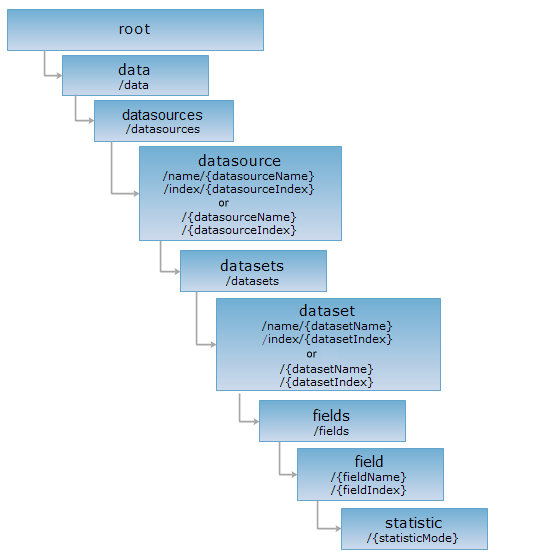<field_uri>/{statisticMode}[.<format>]
The statistic resource represents the statistics on the <field_uri> identified field. The statistical method used are decided by the statisticMode in URI.
Please refer to the development guide for information about this resource usage: Field Statistic.
Supported methods:
Supported output formats: RJSON, JSON, HTML, XML.

Implement the HTTP request on the following URI, where supermapiserver is the name of the server, World is a datasource on the server, Ocean is a dataset in the World datasource and WRLD30_ID is a field in the Ocean dataset,and get the response in rjson format. AVERAGE represents statistic mean value of the WRLD30_ID field in the example usage statistic resource.
http://supermapiserver:8090/iserver/services/data-world/rest/data/datasources/name/World/datasets/name/Ocean/fields/WRLD30_ID/AVERAGE.rjson
Gets statistics on a field in the dataset.
Implement the GET request on the statistic resource. Carrying out statistics on the field needs to include the statistic mode information in the URI. The possible value before ? can be as follows:
| Enumerated value | Description |
| AVERAGE | The mean value. |
| MAX | The maximum value. |
| MIN | The minimum value. |
| STDDEVIATION | The standard deviation. |
| SUM | The sum. |
| VARIANCE | The variance. |
Implement the GET request on the statistic resource and get the statistics on the field. The structure of the returned request body sees as follows:
| Field | Type | Description |
| mode | StatisticMode | The statistical method. |
| result | double | The statistical result. |
Implement the GET request on http://supermapiserver:8090/iserver/services/data-world/rest/data/datasources/name/World/datasets/name/Ocean/fields/WRLD30_ID/AVERAGE.rjson to get the average of the WRLD30_ID field. The response in rjson format sees as follows:
{
"mode": "AVERAGE",
"result": 36.5
}
Asks for the response identical to the one that would correspond to a GET request, but without the response body. This is useful for retrieving meta-information written in response headers, without having to transport the entire content. The meta-information includes the media-type, content-encoding, transfer-encoding, content-length, etc.
The HEAD request helps check the existence of the statistic resource and whether it can be accessed by the client. By implementing the HEAD request on the URI, with .<format> appended to the end, we can quickly get to know whether the statistic resource supports the representation in <format> or not.